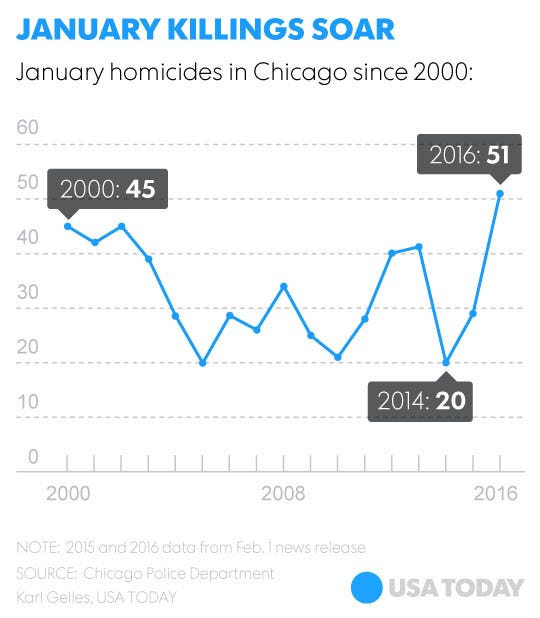Chicago records 51 homicides in January, highest toll since 2000
CHICAGO — The nation's third largest city recorded 51 homicides in January, the highest toll for the month since at least 2000.

Gang conflicts and retaliatory violence drove the "unacceptable" increase in homicides, the police department said in a statement. But the rise in violence also notably comes as the Chicago Police Department faces increased scrutiny following the court-ordered release of a police video showing a white police officer fatally shooting a black teenager 16 times, and as the department implements changes in how it monitors street stops by officers.
Chicago routinely records more homicides annually than any other American city, but the grim January violence toll marks a shocking spike in violence in a city that recorded 29 murders for the month of January last year and 20 murders for the month in 2014. In addition to the jump in killings, police department said that it recorded 241 shooting incidents for the month, more than double the 119 incidents recorded last January.
The rise in violence comes after the Chicago Police Department reported 468 murders in 2015, a 12.5% increase from the year before. There were also 2,900 shootings, 13% more than the year prior, according to police department records.

In recent weeks, the police department pushed back against the notion that the rise in homicides could be due to cops becoming less aggressive due to the negative attention the department has received in the aftermath of the release of the police video showing the shooting of Laquan McDonald. The city saw several weeks of largely peaceful protests after the release of the video. The U.S. Justice Department has launched a civil rights investigation of the city.
Mayor Rahm Emanuel, who faced fierce backlash in the city's African-American community over his handling of the McDonald case, fired his police superintendent, Garry McCarthy, after the video's release.
Interim Superintendent John Escalante expressed frustration earlier this month as the homicide toll climbed, but said it was due mainly to gang activity. He also said he was concerned about social media fueling gang disputes, with fatal incidents starting as a war of words on the Internet.
"It's the new way of taunting, challenging other gangs," Escalante told reporters. "It's the modern way of gang graffiti."
St. Louis saw a dramatic increase in the number homicides following the August 2014 police shooting death of Michael Brown in nearby Ferguson, which spurred months of angry protests. And Baltimore saw a spike in homicides following the death of Freddie Gray in Baltimore in April, an incident that sparked unrest in the Charm City. In both Baltimore and St. Louis, the rise in violent crime began to increase prior to the high-profile incidents and accelerated afterward.
Mayor Rahm Emanuel taps high-profile officer to advise Chicago police
The department says it has seen a decrease in investigative stops by cops on the streets after new rules went into effect Jan. 1 requiring the police department to bolster the monitoring of stops and protective pat downs known as "stop-and-frisk."
The police department entered an agreement with the American Civil Liberties Union to record contact cards for all street stops after the organization criticized the the city's police for disproportionately targeting minorities for questioning and searches. In the past, police officers were required only to fill out cards for stops that didn't result in an arrest. The new contact cards also require police officers to offer greater detail about the stops than they have in the past.

The police department says it recently moved 350 police officers and 31 sergeants from foot patrols into vehicles to help increase visibility in communities hardest hit by the rise of shootings and to improve their ability to quickly respond to incidents.
The department says it has also conducted a series of raids in areas of the city it knows are problematic. One raid last week netted 64 arrests, including 40 suspects who are documented gang members, and the seizure of over $200,000 worth of drugs. Police say they also seized 19 weapons in the raid.
Chicago looks for new police chief to work with embattled Rahm Emanuel
The department has also asked the Cook County Sheriff's Department to step up enforcement of individuals on supervised release and act on outstanding arrest warrants.
Follow USA TODAY reporter Aamer Madhani on Twitter:AamerISmad